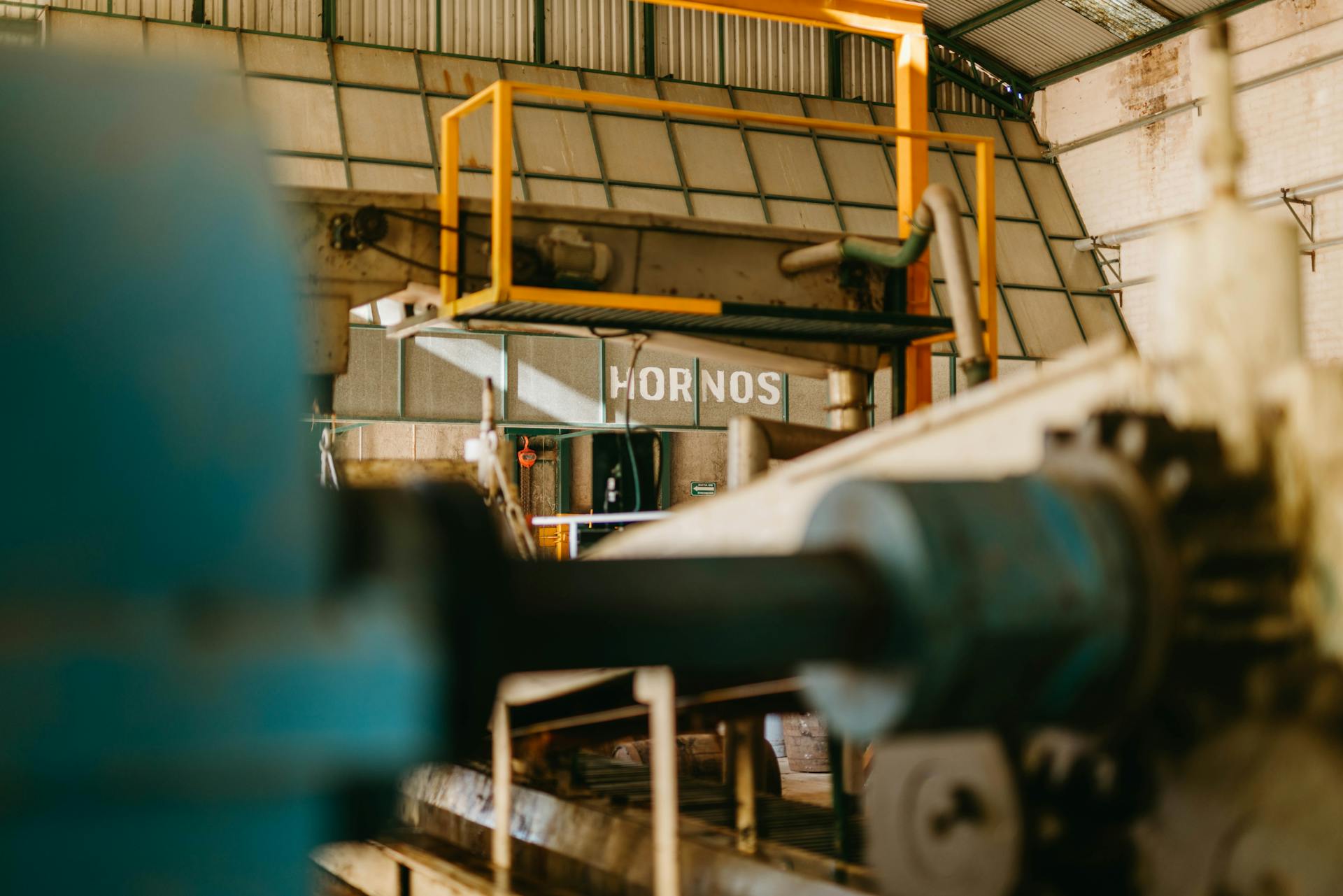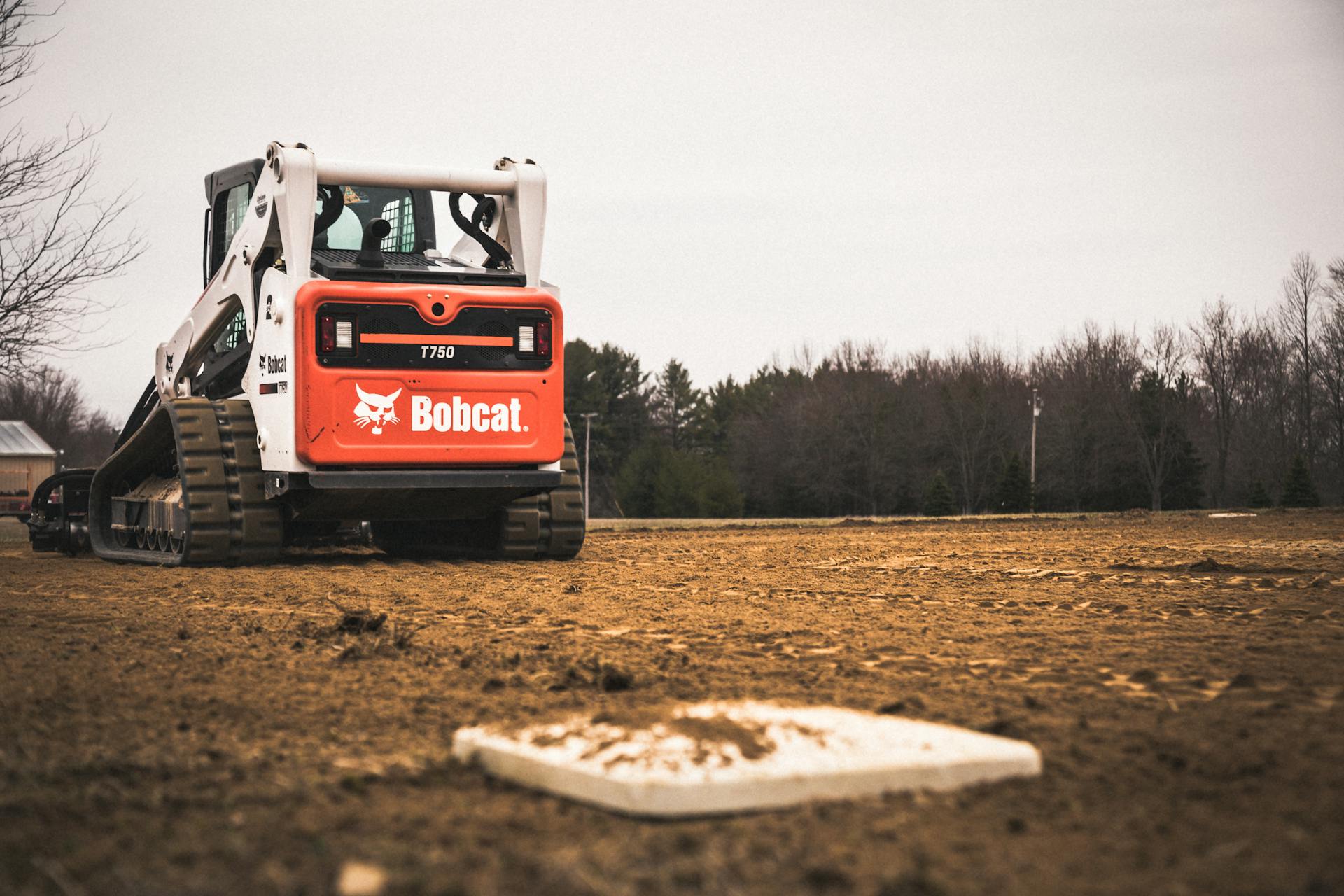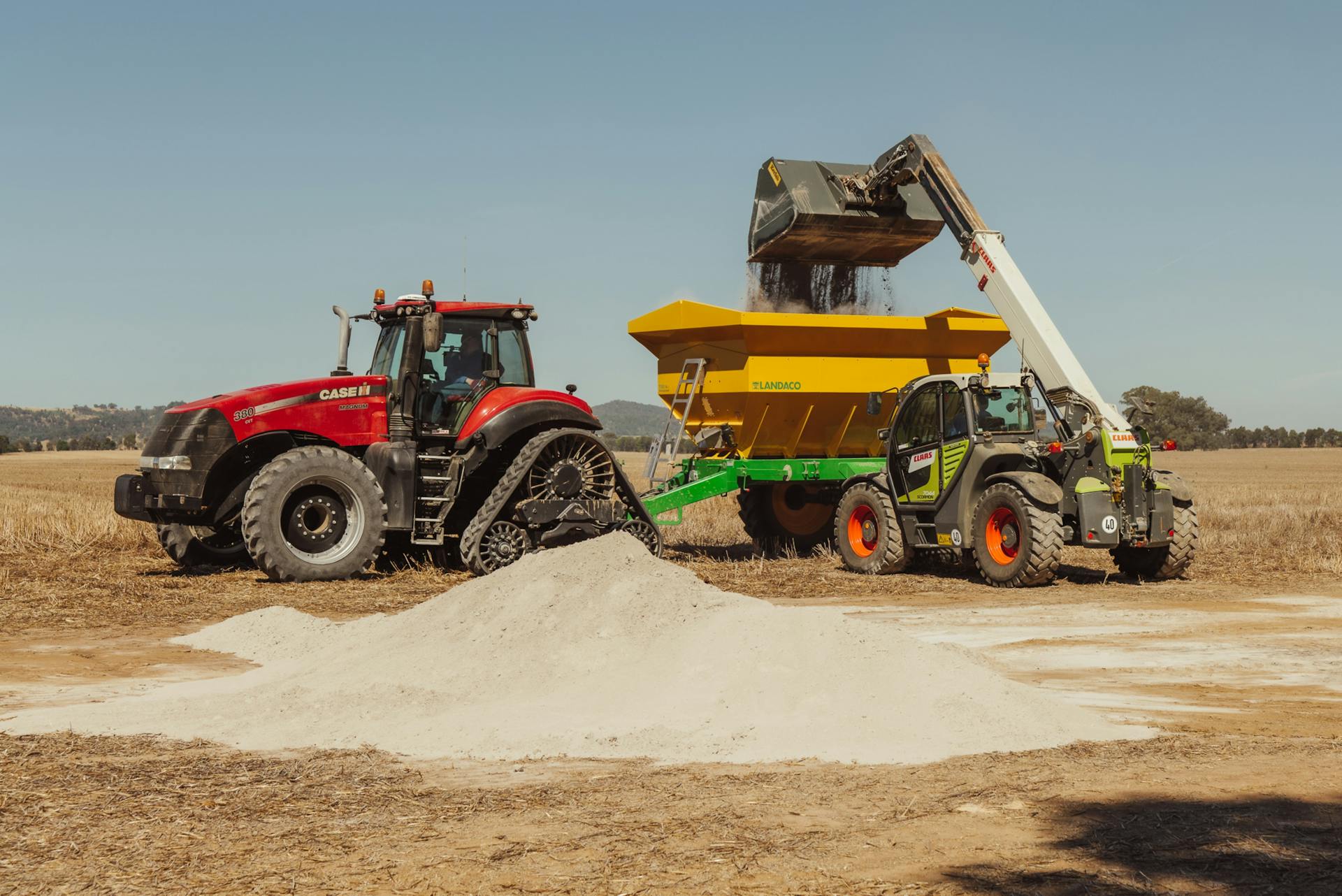
To be a successful heavy equipment operator, you need to possess a unique combination of physical and mental skills. A strong foundation in mathematics and physics is essential, as operators need to be able to calculate distances, angles, and weights to ensure safe and efficient operation.
Developing good spatial awareness is crucial, as operators need to be able to visualize the movement of heavy equipment and its surroundings. This includes understanding the dimensions of the equipment, as well as the layout of the work site.
Physical stamina is also vital, as operators often work long hours in physically demanding conditions. The ability to withstand extreme temperatures, noise, and vibrations is essential.
To succeed in this field, you should be prepared to work in a variety of environments, from construction sites to mines and quarries.
Take a look at this: How Do Tower Cranes Work
Heavy Equipment Operator Skills
As a heavy equipment operator, you'll need to possess a range of skills to perform your duties effectively. One of the most important skills is the ability to operate heavy equipment safely and efficiently.
To do this, you'll need to be familiar with the different types of equipment, such as backhoes, bulldozers, and graders. These machines are used for various tasks like excavating, moving, loading, and grading earth, rock, gravel, or other materials.
Here are some of the key skills you'll need to master:
- Pre-operational checks: You'll need to perform regular checks on equipment to ensure it's in good working condition.
- Cleaning and maintenance: Regular cleaning and lubrication of equipment is crucial to prevent breakdowns and ensure smooth operation.
- Load handling: You'll need to know how to load and unload cargo safely and efficiently.
By developing these skills, you'll be well on your way to becoming a proficient heavy equipment operator.
Duties
As a heavy equipment operator, you'll be responsible for operating a variety of machinery to get the job done. This can include operating backhoes, bulldozers, loaders, and graders to excavate, move, load, and grade earth, rock, gravel, or other materials.
Heavy equipment operators are also tasked with clearing brush and stumps prior to logging activities and building roads at logging and surface mining sites. This requires running bulldozers or other heavy equipment.
Operating heavy equipment with a pile driver head is another crucial duty, where you'll drive piling into earth to provide support for buildings, bridges, or other structures. You'll need to be precise and careful in this role.
A different take: Small Earth Moving Equipment
In addition to operating heavy equipment, you'll also be responsible for doing pre-operational checks on equipment, as well as cleaning, lubricating, and refilling it as needed. This is an important part of ensuring the equipment runs smoothly and efficiently.
Here's a breakdown of some of the specific duties you might perform as a heavy equipment operator:
- Operate heavy equipment such as backhoes, bulldozers, loaders, and graders
- Run bulldozers or other heavy equipment to clear brush and stumps
- Operate heavy equipment with pile driver head
- Run heavy dredging equipment
- Operate heavy paving and surfacing equipment
- Run power shovels
- Run heavy equipment to move, load, and unload cargo
Material Handler
Material handlers use heavy equipment like forklifts and cranes to move materials in various industries. This job involves operating the machinery and coordinating with a team to ensure efficient and safe material handling processes.
Material handlers need knowledge of the specific machinery they operate, as well as industry and job site safety protocols. They should also know proper lifting techniques to avoid injury.
Operating heavy equipment comes with risks and hazards, such as loud noises, vibrations, and stress from operating large machinery. Excavator operators, for example, may be exposed to these hazards while working in tight spaces or hazardous conditions.
Material handlers should follow industry guidelines and safety protocols when operating machinery to minimize risks. They should also use personal protective equipment (PPE) like ear plugs, respirators, and safety goggles to protect against injuries or exposure to hazardous materials.
For more insights, see: Farming Machinery
Types of Heavy Equipment
As a heavy equipment operator, you'll work with a variety of machines, each with its own unique function. Some common types of heavy equipment include bulldozers, which are used for pushing and moving large quantities of materials, often in construction, mining, and forestry industries.
Bulldozers are just one example of the many types of heavy equipment out there. Excavators, for instance, are used for digging, lifting, and moving materials, demolition, and other tasks requiring precision and strength.
Some other types of heavy equipment you may work with include cranes, which are used for lifting and moving heavy materials, often on construction sites. Forklifts, on the other hand, are commonly seen in warehouses and distribution centers, used for lifting and transporting materials.
Here are some common types of heavy equipment:
- Bulldozers: used for pushing and moving large quantities of materials
- Excavators: used for digging, lifting, and moving materials, demolition, and other tasks requiring precision and strength
- Cranes: used for lifting and moving heavy materials
- Forklifts: used for lifting and transporting materials
- Dump trucks: primarily transport loose materials such as dirt, gravel, and demolition debris
- Backhoes: similar to excavators, used for digging and moving materials
- Loaders: used for loading materials, often onto dump trucks or storage areas
- Asphalt pavers and rollers: used for laying and smoothing asphalt on roadways and other surfaces
- Scrapers: often used in mining, construction, and farming industries, usually for moving and removing large quantities of materials
- Skid steers: a versatile machine used for various tasks, including digging, loading materials, and demolition
- Road graders: used for leveling and maintaining dirt or gravel roads
Backhoes
Backhoes are incredibly versatile and can be used for a variety of tasks, such as digging a trench, uprooting trees, and grading a road.
One of the most distinctive features of a backhoe is its resemblance to a large spider, making it hard to miss on a construction site.
Backhoes are used extensively on construction sites, so it's rare to find a site without one.
You might have even had a toy version of a backhoe as a child, and now you can see why it's a popular choice for construction work.
Backhoes can be used to push dirt and plow snow, among many other applications.
Additional reading: Tractor Loader and Backhoe
Dozers
Dozers, also known as bulldozers, are incredibly powerful machines that can move heavy objects and materials with ease.
They're often used for shallow digging and can push massive rocks, debris, and even boulders short distances. Their versatility makes them a staple on most job sites.
Dozers are perfect for tasks like building roads and working on farms. They can handle heavy equipment and materials with precision and strength.
Here are some examples of tasks that dozers are commonly used for:
- Building roads
- Working on farms
- Moving rocks and debris
Graders
Graders are used to create flat surfaces with their long blades, and their main application is paving roads. They help to finish a project with accuracy.
Graders are often used before asphalt is laid down to ensure it will be applied smoothly and evenly. This precision is crucial for a seamless finish.
The road grader's precision is essential for paving roads, and it's a key piece of equipment for getting the job done right.
Recommended read: Precision Farming Equipment
Loaders
Loaders are versatile machines that can move a variety of heavy materials, including dirt, debris, snow, gravel, logs, recycled material, and sand.
Their uses extend far beyond construction sites, with FEMA and similar organizations relying on them to clean up after major weather events like hurricanes.
Loaders are also crucial in the logging industry and waste management industry.
Once you learn to maneuver a loader, career opportunities will open up in numerous industries.
Worth a look: Kanga Loaders
Skid Steer
The skid steer is a versatile piece of machinery found on many job sites. It's exceptional in tight spots where access is limited.
Its lifting capacity makes it perfect for tasks like landscaping and post hole digging.
The skid steer is driven using differential steering, which allows for zero-radius turning. This is made possible by operating the left and right wheel pairs at different speeds.
Additional reading: Tractor vs Skid Loader
Paving and Surfacing
Paving and surfacing operators work with a range of heavy equipment, including asphalt pavers and rollers, which are used to lay and smooth asphalt on roadways and other surfaces.
Asphalt pavers and rollers are crucial for projects like constructing new roads and highways, repairing existing roadways, and sealing and patching roads to extend their life span or improve surface quality.
These machines help create a smooth and even surface, which is essential for road safety and durability.
To operate asphalt pavers and rollers effectively, you need to understand asphalt paving processes and techniques, as well as the specific machinery you'll be working with.
Some common tasks for paving and surfacing operators include:
- Operating asphalt pavers and rollers
- Coordinating with a team to ensure quality and smoothness of the finished surface
Graders, another type of heavy equipment, are also used in paving and surfacing projects to create flat surfaces before asphalt is laid down.
Road graders, in particular, are used to create a flat road surface, which is essential for paving roads smoothly and evenly.
Worth a look: Names of Road Construction Machines
Frequently Asked Questions
What are the hard skills of an operator?
Hard skills for an operator include operating machinery, maintenance, and safety protocols. These technical skills are essential for performing job tasks effectively
What are the duties of an equipment operator?
An equipment operator is responsible for safely operating heavy machinery and performing routine maintenance to ensure equipment is in good working condition. This includes operating bulldozers, backhoes, forklifts, and cranes, among other equipment.
Featured Images: pexels.com


